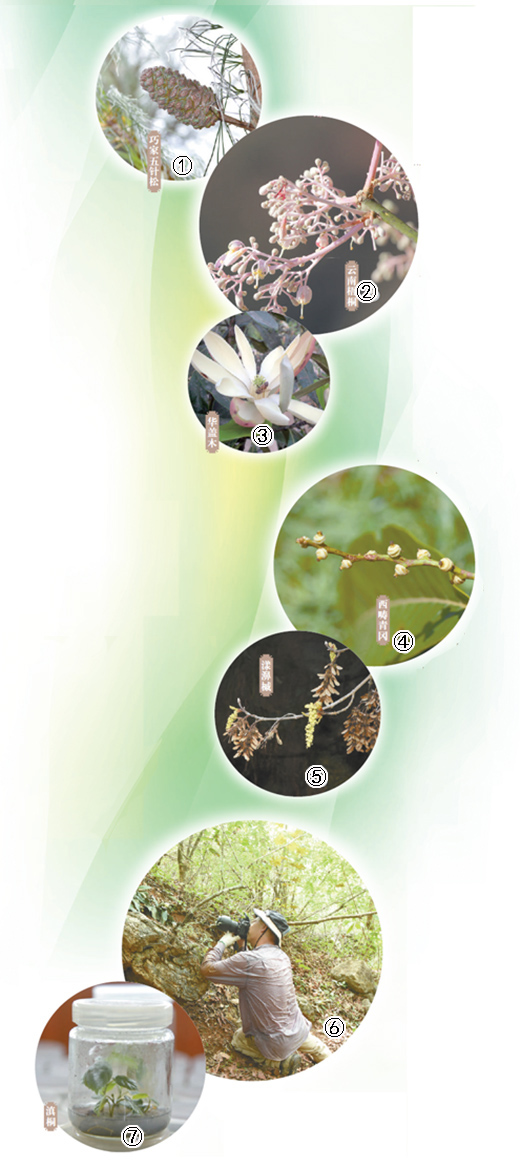SW China stays active in conservation of plant species with extremely small populations
Southwest China's Yunnan Province has made active efforts to promote the protection of plant species with extremely small populations, or PSESPs, in recent years.
Yunnan has made progress in protecting PSESPs, thanks to over 10 years of arduous efforts.

①: A fruit of Pinus squamata, or the Qiaojia pine. (Photo/Tao Lian)
②: Flowers of Firmiana major, a plant species. (Photo/Yang Jing)
③: A flower of Pachylarnax sinica, a plant species. (Photo/Sun Weibang)
④: A branch of Quercus sichourensis, a plant species. (Photo/Chen Zhifa)
⑤: Flowers and fruits of Acer yangbiense, a plant species. (Photo/Tao Lidan)
⑥:A researcher takes photos of Paphiopedilum concolor, a plant species, during a field survey. (Photo/Cai Lei)
⑦: A tissue culture seedling of Craigia yunnanensis, a plant species. (Photo/Luo Guifen)
Pachylarnax sinica, a critically endangered tree species, increased from six when they were discovered for the first time in the wild to more than 15,000 at present.
When Pinus squamata, or the Qiaojia pine, a national first-class protected plant, was first found in the 1990s in the wild, there were only 34 individual plants of the species remaining in the world. So far, nearly 10,000 Qiaojia pines have been artificially cultivated.
In August 2021, a Qiaojia pine grown at the Kunming Botanical Garden under the Kunming Institute of Botany affiliated to the Chinese Academy of Sciences in Kunming, capital of Yunnan bore fruits for the first time. This marked the initial success of ex-situ conservation of the species.
Over 30 PSESPs in Yunnan, such as Pachylarnax sinica, Acer yangbiense, Pinus squamata, and Nyssa yunnanensis, no longer face the threat of extinction.
In early 2023, three departments in the province issued a plan to rescue and conserve PSESPs, which included 101 species for protection.
Yunnan proposed to protect PSESPs in 2005 and issued a guideline and an emergency action plan in this regard five years later.
In 2012, China released a plan to rescue and conserve the country's PSESPs (2011-2015).
To rescue and conserve PSESPs is to protect strategic biological resources for China's sustainable development, and is of great significance to the conservation of biodiversity in the country, said Sun Weibang, a researcher at the Kunming Institute of Botany and director of the Yunnan Key Laboratory for Integrative Conservation of Plant Species with Extremely Small Populations under the institute.
Sun and his teams have been committed to the publicity and systematic research of PSESPs, and campaigns to protect PSESPs over the past more than 10 years. They have completed the research for the conservation of several PSESPs.
Firmiana major, a PSESP, almost became extinct in the wild at the end of the 1990s. In 2017, Sun led a team to conduct a field survey and accidentally found wild Firmiana major, including a dozen at a place in Jiangbian township, Yuanmou county, Yunnan.
In September 2021, research institutions, local forestry and grassland bureaus and other departments established Yunnan's first site for in-situ conservation of Firmiana major in the township and gave away seedlings of the plant to villagers and rangers to encourage them to participate in the protection of the plant species.
Yunnan has established a comprehensive system for PSESP conservation, including methods such as in-situ, near-situ, and ex-situ conservation, as well as the storage of germplasm resources, and the reintroduction of PSESPs to their natural habitats, said Sun.
Over the past 10-plus years, Yunnan has carried out over 120 projects to protect PSESPs, said Yang Wenzhong, a researcher at the Yunnan Academy of Forestry and Grasslands. The province has established 30 conservation areas (sites), 13 near-situ and ex-situ conservation bases (gardens), and five experimental bases for the protection of PSESPs. Over 100,000 plants of 61 PSESPs are under ex-situ conservation in the province.
Luo Guifen, a senior engineer at the Kunming Institute of Botany, has succeeded in developing rapid propagation techniques for cultivating tissue culture seedlings of Firmiana major, a tree species with the potential for afforestation and with its seeds being edible.
"Compared to natural seeding, it's easier to cultivate tissue culture seedlings. This is of great significance to expanding populations of trees like Firmiana major," Luo said.
Yunnan has also promoted the sustainable utilization of PSESPs to better protect them. A few PSESPs boast a high value in both medical use and sightseeing, including Malania oleifera, an endangered and highly valued tree species that is rich in neuronic acid.
An institute under the Yunnan Academy of Forestry and Grasslands has increased the survival rate of transplanted Malania oleifera to over 85 percent through years of efforts. Now, 2 million seedlings of the plant species can be cultivated a year.
Malania oleifera has now been planted on over 24,000 mu (1,600 hectares) of land in the plant's natural habitats in Guangnan county, Yunnan, and has become the local people’s secret of income increase.
Protecting PSESPs has become a consensus in society since it was proposed in 2005, and China's experiences and practices in this regard have been promoted in many countries.
Yunnan compiled a new list of PSESPs (the 2022 version) and put forward a new 10-year plan for the conservation of PSESPs in the province, marking a new stage in PSESP protection.
Unlike the 2010 version, which covered 62 species, the new list consists of 101 species. Over 10 names on the old list, including Pachylarnax sinica, Pinus squamata, and Malania oleifera, were not included in the latest version thanks to remarkable progress to protect them.
Photos
Related Stories
- National park project boosts desert biodiversity in China's Xinjiang
- Sri Lankan, Chinese experts hold symposium on coral reef ecology
- China's Sanjiangyuan bolsters biodiversity conservation efforts
- Exploring the rich biodiversity on China's Snake Island
- Beijing continues to improve biodiversity
- UN chief urges gov'ts, businesses to take bold action for sustainable future
Copyright © 2023 People's Daily Online. All Rights Reserved.









